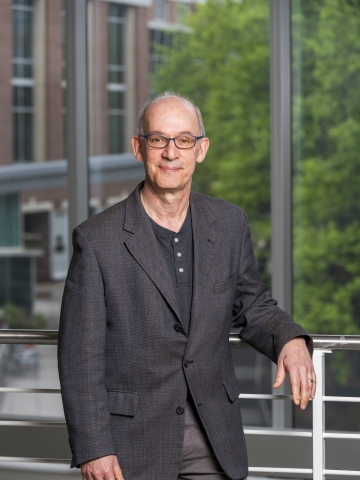M.G. Finn
Contact Information
- mgfinn@gatech.edu
- Phone
- (404) 385-5488
- Fax
- (404) 894-5909
- Location
- MoSE 2201B
- Research Group
- Finn Group
- Publication Links
- Google Scholar

M.G. Finn
Regents’ Professor
Awards
ACS Cope Scholar Award, 2017
Children's Research Scholar, Children's Healthcare of Atlanta, 2015
Alexander von Humboldt Foundation Research Award, 2012
The Scripps Research Institute Outstanding Mentor Award, 2011
Packard Foundation Interdisciplinary Science Award, 2002-2006
Education
B.Sc., 1980, California Institute of Technology; Ph.D., 1986, Massachusetts Institute of Technology
Research
We develop chemical and biological tools for research in a wide range of fields. Some of them are briefly described below; please see our group web page for more details.
Chemistry, biology, immunology, and evolution with viruses. The sizes and properties of virus particles put them at the interface between the worlds of chemistry and biology. We use techniques from both fields to tailor these particles for applications to cell targeting, diagnostics, vaccine development, catalysis, and materials self-assembly. This work involves combinations of small-molecule and polymer synthesis, bioconjugation, molecular biology, protein design, protein evolution, bioanalytical chemistry, enzymology, physiology, and immunology. It is an exciting training ground for modern molecular scientists and engineers.
Development of reactions for organic synthesis, chemical biology, and materials science. Molecular function is what matters most to our scientific lives, and good chemical reactions provide the means to achieve such function. We continue our efforts to develop and optimize reactions that meet the click chemistry standard for power and generality. Our current focus is on highly reliable reversible reactions, which open up new possibilities for polymer synthesis and modification, as well as for the controlled delivery of therapeutic and diagnostic agents to biological targets.
Traditional and combinatorial synthesis of biologically active compounds. We have a longstanding interest in the development of biologically active small molecules. We work closely with industrial and academic collaborators on such targets as antiviral agents, compounds to combat tobacco addiction, and treatments for inflammatory disease.